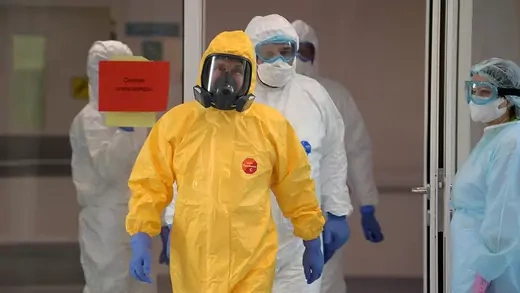By Thomas Graham
President Vladimir Putin planned to use this year to raise his stature as not only the face of Russian politics at home but also a dominant figure on the global stage. Then the new coronavirus intervened.
The official number of cases in Russia of the new coronavirus disease, COVID-19, exceeds 650, with just one reported death. As in other countries, the actual number is certainly higher. While Putin assured Russians just last week that the situation was “generally under control,” he changed his tune this week, warning them to brace for a prolonged battle against a potentially devastating epidemic. In addition to the steps the authorities have already taken to contain the virus—closing borders, banning foreign visitors until May 1, and quarantining possible carriers, among other things—Putin declared that next week will be a paid nonwork week and urged everyone to stay home. He also announced a series of measures to guarantee income and preserve jobs to soften the economic consequences of containing the virus.
The COVID-19 pandemic is forcing Putin to reconsider plans for two major political events this spring, both of which are intended to enhance his image. The first is the constitutional referendum, originally set for April 22. The second is the celebration of the seventy-fifth anniversary of the victory over Nazi Germany on May 9. The referendum will underscore his domination of Russian politics, while the anniversary celebrations will reinforce the legitimacy of the current regime. With COVID-19 surging around the globe, however, neither event will give him the political boost he had anticipated, and, if mishandled, each could badly tarnish his reputation.
A Leader for Life?
In January, Putin proposed amendments to redistribute powers among the president, prime minister, and parliament, prompting speculation about how (not whether) he would preserve power after his final presidential term ends in 2024. At the time, Putin rejected changes that would have allowed him to stay on as president. Then, in March, he ostensibly reconsidered when a legislator offered a further amendment that would enable him to serve an additional two terms. Putin presented the global outbreak of COVID-19 as one reason for changing his mind. His proposed amendments, accordingly modified, were quickly approved by the parliament, regional legislatures, and constitutional court.

Wearing protective gear, Russian President Vladimir Putin visits a hospital for patients infected with the new coronavirus on the outskirts of Moscow. Sputnik/Alexey Druzhinin/Kremlin/Reuters
The last step for these amendments is the national referendum. There is no doubt Putin’s proposal will pass, and by a sizable margin. But for Putin the measure of success is not the margin; it is the turnout, a much better indicator of popular support when victory is assured. To demonstrate his political prowess, Putin will have to clear the bar he set in the 2018 presidential election: a 67.5 percent turnout. That could hardly be guaranteed amid the coronavirus scare, without obvious cheating or running the grave risk of worsening the epidemic. This week, Putin bowed to reality and postponed the referendum. Underlining the gravity of the situation, Putin said rescheduling the vote will depend upon the advice of medical professionals.
Raining on the Parades
Putin faces a similar but more consequential decision with the May 9 celebrations. The plan was to put on a spectacular display of military power before a large assembly of world leaders in Red Square to underscore Russia’s—and Putin’s—international prestige. Another parade, the March of the Immortals, in which Muscovites commemorate relatives who fought in World War II, nurtures patriotism.
Holding the events as planned risks infecting thousands of troops and spectators. And with the virus raging in other countries, many foreign leaders will elect to stay away. Some capitals may determine it unwise to send delegations given conditions in Russia and leave representation at the festivities, if any, to their local ambassadors. This would be a major disappointment for Putin, and a spike in virus cases afterward would tarnish Putin’s image. But none of the alternatives—canceling, postponing, or scaling back the celebrations—is attractive, and none would carry anywhere near the same fervor. Putin thus faces a decision he would rather not take.
Economic Doldrums
Besides these two highly symbolic political events, Putin has to worry about the economic consequences of the COVID-19 pandemic. Socioeconomic discontent has risen in recent years, in part because real disposable income has at best been stagnant since 2014.
In January, Putin vowed to accelerate economic growth and raise standards of living. He reshuffled the government to put in place highly professional economic managers as ministers, who were charged with spearheading more than a dozen national projects focusing on areas including health, education, and infrastructure. The projects were to inject close to $400 billion into the economy by the end of 2024. However, COVID-19 has dashed that plan, as an all-but-inevitable global recession will further sink Russia’s economy. The task, as Putin now recognizes, is to minimize the damage. A year of great ambition has thus turned into a year of great trial for Putin.
No comments:
Post a Comment